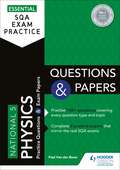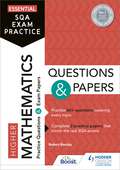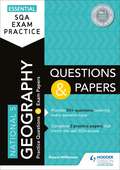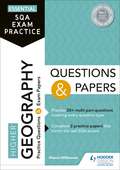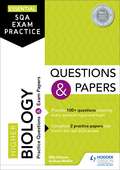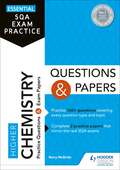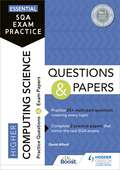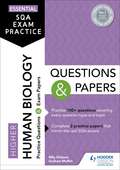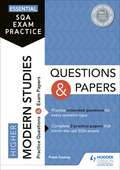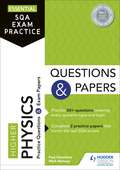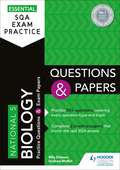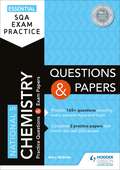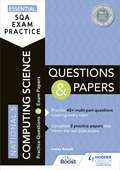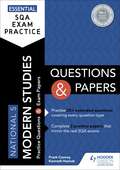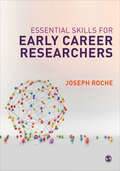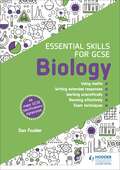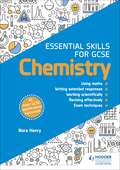- Table View
- List View
Essential SQA Exam Practice: From the publisher of How to Pass
by Paul Van der BoonExam board: SQALevel: National 5Subject: PhysicsFirst teaching: September 2017First exam: Summer 2018Practice makes permanent. Feel confident and prepared for the SQA National 5 Physics exam with this two-in-one book, containing practice questions for every question type and topic, plus two full practice papers - all written by an experienced examiner.- Choose to revise by question type or topic: A simple grid enables you to pick particular question styles or course areas that you want to focus on, with answers provided at the back of the book- Understand what the examiner is looking for: Clear guidance on how to answer each question type is followed by plenty of questions so you can put the advice into practice, building essential exam skills- Remember more in your exam: Repeated and extended practice will give you a secure knowledge of the key areas of the course (dynamics; space; electricity; properties of matter; waves; radiation)- Familiarise yourself with the exam paper: Both practice papers mirror the language and layout of the real SQA papers; complete them in timed, exam-style conditions to increase your confidence before the exams- Find out how to achieve a better grade: Answers to the practice papers have commentaries for each question, with tips on writing successful answers and avoiding common mistakesFully up to date with SQA's requirementsThe questions, mark schemes and guidance in this practice book match the requirements of the revised SQA National 5 Physics specification for examination from 2018 onwards.
Essential SQA Exam Practice: From the publisher of How to Pass
by Robert BarclayExam board: SQALevel: HigherSubject: MathematicsFirst teaching: September 2018First exam: Summer 2019Practice makes permanent. Feel confident and prepared for the SQA Higher Maths exam with this two-in-one book, containing practice questions for every topic, plus two full practice papers - all written by an experienced examiner.- Choose which topics you want to revise: A simple grid enables you to pick particular areas of the course that you want to answer questions on, with solutions provided at the back of the book- Remember more in your exam: Repeated and extended practice of calculator and non-calculator questions will improve your algebraic, trigonometric, geometric, calculus and reasoning skills- Familiarise yourself with the exam papers: Both practice papers mirror the language and layout of the real SQA papers; complete them in timed, exam-style conditions to increase your confidence before the exams- Find out how to achieve a better grade: Answers to the practice papers have commentaries for each question, with tips on writing successful answers and avoiding common mistakesFully up to date with SQA's requirementsThe questions, mark schemes and guidance in this practice book match the requirements of the revised SQA Higher Maths specification for examination from 2019 onwards.
Essential SQA Exam Practice: From the publisher of How to Pass
by Robert BarclayExam board: SQALevel: HigherSubject: MathematicsFirst teaching: September 2018First exam: Summer 2019Practice makes permanent. Feel confident and prepared for the SQA Higher Maths exam with this two-in-one book, containing practice questions for every topic, plus two full practice papers - all written by an experienced examiner.- Choose which topics you want to revise: A simple grid enables you to pick particular areas of the course that you want to answer questions on, with solutions provided at the back of the book- Remember more in your exam: Repeated and extended practice of calculator and non-calculator questions will improve your algebraic, trigonometric, geometric, calculus and reasoning skills- Familiarise yourself with the exam papers: Both practice papers mirror the language and layout of the real SQA papers; complete them in timed, exam-style conditions to increase your confidence before the exams- Find out how to achieve a better grade: Answers to the practice papers have commentaries for each question, with tips on writing successful answers and avoiding common mistakesFully up to date with SQA's requirementsThe questions, mark schemes and guidance in this practice book match the requirements of the revised SQA Higher Maths specification for examination from 2019 onwards.
Essential SQA Exam Practice: From the publisher of How to Pass
by Sheena WilliamsonExam board: SQALevel: National 5Subject: GeographyFirst teaching: September 2017First exam: Summer 2018Practice makes permanent. Feel confident and prepared for the SQA National 5 Geography exam with this two-in-one book, containing practice questions for every question type and the most popular topics, plus two full practice papers.- Choose to revise by question type or topic: A simple grid enables you to pick particular question styles or course areas that you want to focus on, with answers provided at the back of the book- Understand what the examiner is looking for: Clear guidance on how to answer each question type is followed by plenty of questions so you can put the advice into practice, building essential exam skills- Remember more in your exam: Repeated and extended practice will give you a secure knowledge of the key areas of the course (physical environments; human environments; global issues)- Familiarise yourself with the exam paper: Both practice papers mirror the language and layout of the real SQA papers; complete them in timed, exam-style conditions to increase your confidence before the exams- Find out how to achieve a better grade: Answers to the practice papers have commentaries for each question, with tips on writing successful answers and avoiding common mistakesFully up to date with SQA's requirementsThe questions, mark schemes and guidance in this practice book match the requirements of the revised SQA National 5 Geography specification for examination from 2018 onwards.This book covers the following topics:Section 1: Physical Environments:- Landscape Types- WeatherSection 2: Human Environments:- World Population Distribution and Change- Issues in Changing Urban and Rural LandscapesSection 3: Global Issues:- Climate Change- Natural Regions- Environmental Hazards- Trade and Globalisation- Tourism- Health
Essential SQA Exam Practice: From the publisher of How to Pass
by Sheena WilliamsonExam board: SQALevel: HigherSubject: GeographyFirst teaching: September 2018First exam: Summer 2019Practice makes permanent. Feel confident and prepared for the SQA Higher Geography exam with this two-in-one book, containing practice questions for every question type and the most popular topics, plus two practice papers.- Choose to revise by question type or topic: A simple grid enables you to pick particular question styles or course areas that you want to focus on, with answers provided at the back of the book- Understand what the examiner is looking for: Clear guidance on how to answer each question type is followed by plenty of questions so you can put the advice into practice, building essential exam skills- Remember more in your exam: Repeated and extended practice will give you a secure knowledge of the key areas of the course (physical environments; human environments; global issues)- Familiarise yourself with the exam papers: Both practice papers mirror the language and layout of the real SQA papers; complete them in timed, exam-style conditions to increase your confidence before the exams- Find out how to achieve a better grade: Answers to the practice papers have commentaries for each question, with tips on writing successful answers and avoiding common mistakesFully up to date with SQA's requirementsThe questions, mark schemes and guidance in this practice book match the requirements of the revised SQA Higher Geography specification for examination from 2019 onwards.This book covers the following topics:Physical environments:- Atmosphere- Hydrosphere- Lithosphere- BiosphereHuman environments:- Population- Urban- RuralGlobal issues:- River basin management- Development and health- Climate change- Energy
Essential SQA Exam Practice: Higher Biology Questions and Papers
by Graham Moffat Billy DicksonExam board: SQALevel: HigherSubject: BiologyFirst teaching: September 2018First exam: Summer 2019Practice makes permanent. Feel confident and prepared for the SQA Higher Biology exam with this two-in-one book, containing practice questions for every question type and topic, plus two full practice papers - all written by experienced examiners.- Choose to revise by question type or topic: A simple grid enables you to pick particular question styles or course areas that you want to focus on, with answers provided at the back of the book- Understand what the examiner is looking for: Clear guidance on how to answer each question type is followed by plenty of questions so you can put the advice into practice, building essential exam skills- Remember more in your exam: Repeated and extended practice will give you a secure knowledge of the key areas of the course (DNA and the genome; metabolism and survival; sustainability and interdependence)- Familiarise yourself with the exam papers: Both practice papers mirror the language and layout of the real SQA papers; complete them in timed, exam-style conditions to increase your confidence before the exams- Find out how to achieve a better grade: Answers to the practice papers have commentaries for each question, with tips on writing successful answers and avoiding common mistakesFully up to date with SQA's requirementsThe questions, mark schemes and guidance in this practice book match the requirements of the revised SQA Higher Biology specification for examination from 2019 onwards.
Essential SQA Exam Practice: Higher Chemistry Questions and Papers
by Barry McBrideExam board: SQALevel: HigherSubject: ChemistryFirst teaching: September 2018First exam: Summer 2019Practice makes permanent. Feel confident and prepared for the SQA Higher Chemistry exam with this two-in-one book, containing practice questions for every question type and topic, plus two full practice papers.- Choose to revise by question type or topic: A simple grid enables you to pick particular question styles or course areas that you want to focus on, with answers provided at the back of the book- Understand what the examiner is looking for: Clear guidance on how to answer each question type is followed by plenty of questions so you can put the advice into practice, building essential exam skills- Remember more in your exam: Repeated and extended practice will give you a secure knowledge of the key areas of the course (chemical changes and structure; nature's chemistry; chemistry in society; researching chemistry)- Familiarise yourself with the exam papers: Both practice papers mirror the language and layout of the real SQA papers; complete them in timed, exam-style conditions to increase your confidence before the exams- Find out how to achieve a better grade: Answers to the practice papers have commentaries for each question, with tips on writing successful answers and avoiding common mistakesFully up to date with SQA's requirementsThe questions, mark schemes and guidance in this practice book match the requirements of the revised SQA Higher Chemistry specification for examination from 2019 onwards.
Essential SQA Exam Practice: Higher Computing Science Questions and Papers
by David AlfordExam board: SQALevel: HigherSubject: Computing ScienceFirst teaching: September 2018First exam: Summer 2019Practice makes permanent. Feel confident and prepared for the SQA Higher Computing Science exam with this two-in-one book, containing practice questions for every topic, plus two full practice papers - all written by an experienced marker.- Choose which topics you want to revise: A simple grid enables you to pick particular areas of the course that you want to answer questions on, with solutions provided at the back of the book- Remember more in your exam: Repeated and extended practice will give you a secure knowledge of the key areas of the course (software design and development; computer systems; database design and development; web design and development) Familiarise yourself with the exam paper: Both practice papers mirror the language and layout of the real SQA papers; complete them in timed, exam-style conditions to increase your confidence before the exams- Find out how to achieve a better grade: Answers to the practice papers have commentaries for each question, with tips on writing successful answers and avoiding common mistakesFully up to date with SQA's requirementsThe questions, mark schemes and guidance in this practice book match the requirements of the revised SQA Higher Computing Science specification for examination from 2019 onwards.
Essential SQA Exam Practice: Higher Geography Questions and Papers
by Sheena WilliamsonExam board: SQALevel: HigherSubject: GeographyFirst teaching: September 2018First exam: Summer 2019Practice makes permanent. Feel confident and prepared for the SQA Higher Geography exam with this two-in-one book, containing practice questions for every question type and the most popular topics, plus two practice papers.- Choose to revise by question type or topic: A simple grid enables you to pick particular question styles or course areas that you want to focus on, with answers provided at the back of the book- Understand what the examiner is looking for: Clear guidance on how to answer each question type is followed by plenty of questions so you can put the advice into practice, building essential exam skills- Remember more in your exam: Repeated and extended practice will give you a secure knowledge of the key areas of the course (physical environments; human environments; global issues)- Familiarise yourself with the exam papers: Both practice papers mirror the language and layout of the real SQA papers; complete them in timed, exam-style conditions to increase your confidence before the exams- Find out how to achieve a better grade: Answers to the practice papers have commentaries for each question, with tips on writing successful answers and avoiding common mistakesFully up to date with SQA's requirementsThe questions, mark schemes and guidance in this practice book match the requirements of the revised SQA Higher Geography specification for examination from 2019 onwards.This book covers the following topics:Physical environments:- Atmosphere- Hydrosphere- Lithosphere- BiosphereHuman environments:- Population- Urban- RuralGlobal issues:- River basin management- Development and health- Climate change- Energy
Essential SQA Exam Practice: Higher Human Biology Questions and Papers
by Graham Moffat Billy DicksonExam board: SQALevel: HigherSubject: Human BiologyFirst teaching: September 2018First exam: Summer 2019Practice makes permanent. Feel confident and prepared for the SQA Higher Human Biology exam with this two-in-one book, containing practice questions for every question type and topic, plus two full practice papers - all written by experienced examiners.- Choose to revise by question type or topic: A simple grid enables you to pick particular question styles or course areas that you want to focus on, with answers provided at the back of the book- Understand what the examiner is looking for: Clear guidance on how to answer each question type is followed by plenty of questions so you can put the advice into practice, building essential exam skills- Remember more in your exam: Repeated and extended practice will give you a secure knowledge of the key areas of the course (human cells; physiology and health; neurobiology and immunology)- Familiarise yourself with the exam papers: Both practice papers mirror the language and layout of the real SQA papers; complete them in timed, exam-style conditions to increase your confidence before the exams- Find out how to achieve a better grade: Answers to the practice papers have commentaries for each question, with tips on writing successful answers and avoiding common mistakesFully up to date with SQA's requirementsThe questions, mark schemes and guidance in this practice book match the requirements of the revised SQA Higher Human Biology specification for examination from 2019 onwards.
Essential SQA Exam Practice: Higher Modern Studies Questions and Papers
by Frank CooneyExam board: SQALevel: HigherSubject: Modern StudiesFirst teaching: September 2018First exam: Summer 2019Practice makes permanent. Feel confident and prepared for the SQA Higher Modern Studies exam with this two-in-one book, containing practice questions for every question type and topic, plus two full practice papers.- Choose to revise by question type or topic: A simple grid enables you to pick particular question styles or course areas that you want to focus on, with answers provided at the back of the book- Understand what the examiner is looking for: Clear guidance on how to answer each question type is followed by plenty of questions so you can put the advice into practice, building essential exam skills- Remember more in your exam: Repeated and extended practice will give you a secure knowledge of the key areas of the course (democracy in Scotland and the United Kingdom; social issues in the United Kingdom; international issues)- Familiarise yourself with the exam papers: Both practice papers mirror the language and layout of the real SQA papers; complete them in timed, exam-style conditions to increase your confidence before the exams- Find out how to achieve a better grade: Answers to the practice papers have commentaries for each question, with tips on writing successful answers and avoiding common mistakesFully up to date with SQA's requirementsThe questions, mark schemes and guidance in this practice book match the requirements of the revised SQA Higher Modern Studies specification for examination from 2019 onwards.
Essential SQA Exam Practice: Higher Physics Questions and Papers
by Paul Chambers Mark RamsayExam board: SQALevel: HigherSubject: PhysicsFirst teaching: September 2018First exam: Summer 2019Practice makes permanent. Feel confident and prepared for the SQA Higher Physics exam with this two-in-one book, containing practice questions for every question type and topic, plus two full practice papers - all written by experienced examiners.- Choose to revise by question type or topic: A simple grid enables you to pick particular question styles or course areas that you want to focus on, with answers provided at the back of the book- Understand what the examiner is looking for: Clear guidance on how to answer each question type is followed by plenty of questions so you can put the advice into practice, building essential exam skills- Remember more in your exam: Repeated and extended practice will give you a secure knowledge of the key areas of the course (our dynamic universe; particles and waves; electricity)- Familiarise yourself with the exam paper: Both practice papers mirror the language and layout of the real SQA papers; complete them in timed, exam-style conditions to increase your confidence before the exams- Find out how to achieve a better grade: Answers to the practice papers have commentaries for each question, with tips on writing successful answers and avoiding common mistakesFully up to date with SQA's requirementsThe questions, mark schemes and guidance in this practice book match the requirements of the revised SQA Higher Physics specification for examination from 2019 onwards.
Essential SQA Exam Practice: National 5 Biology Questions and Papers
by Graham Moffat Billy DicksonExam board: SQALevel: National 5Subject: BiologyFirst teaching: September 2017First exam: Summer 2018Practice makes permanent. Feel confident and prepared for the SQA National 5 Biology exam with this two-in-one book, containing practice questions for every question type and topic, plus two full practice papers - all written by experienced examiners.- Choose to revise by question type or topic: A simple grid enables you to pick particular question styles or course areas that you want to focus on, with answers provided at the back of the book- Understand what the examiner is looking for: Clear guidance on how to answer each question type is followed by plenty of questions so you can put the advice into practice, building essential exam skills- Remember more in your exam: Repeated and extended practice will give you a secure knowledge of the key areas of the course (cell biology; biology: multicellular organisms; biology: life on Earth)- Familiarise yourself with the exam paper: Both practice papers mirror the language and layout of the real SQA papers; complete them in timed, exam-style conditions to increase your confidence before the exams- Find out how to achieve a better grade: Answers to the practice papers have commentaries for each question, with tips on writing successful answers and avoiding common mistakesFully up to date with SQA's requirementsThe questions, mark schemes and guidance in this practice book match the requirements of the revised SQA National 5 Biology specification for examination from 2018 onwards.
Essential SQA Exam Practice: National 5 Chemistry Questions and Papers
by Barry McBrideExam board: SQALevel: National 5Subject: ChemistryFirst teaching: September 2017First exam: Summer 2018Practice makes permanent. Feel confident and prepared for the SQA National 5 Chemistry exam with this two-in-one book, containing practice questions for every question type and topic, plus two full practice papers.- Choose to revise by question type or topic: A simple grid enables you to pick particular question styles or course areas that you want to focus on, with answers provided at the back of the book- Understand what the examiner is looking for: Clear guidance on how to answer each question type is followed by plenty of questions so you can put the advice into practice, building essential exam skills- Remember more in your exam: Repeated and extended practice will give you a secure knowledge of the key areas of the course (chemical changes and structure; nature's chemistry; chemistry in society)- Familiarise yourself with the exam paper: Both practice papers mirror the language and layout of the real SQA papers; complete them in timed, exam-style conditions to increase your confidence before the exams- Find out how to achieve a better grade: Answers to the practice papers have commentaries for each question, with tips on writing successful answers and avoiding common mistakesFully up to date with SQA's requirementsThe questions, mark schemes and guidance in this practice book match the requirements of the revised SQA National 5 Chemistry specification for examination from 2018 onwards.
Essential SQA Exam Practice: National 5 Computing Science Questions and Papers
by Lesley RussellExam board: SQALevel: National 5Subject: Computing ScienceFirst teaching: August 2017First exam: Summer 2018Practice makes permanent. Feel confident and prepared for the SQA National 5 Computing Science exam with this two-in-one book, containing practice questions for every topic, plus two full practice papers - all written by an experienced examiner.> Choose which topics you want to revise: A simple grid enables you to pick particular areas of the course that you want to answer questions on, with solutions provided at the back of the book> Remember more in your exam: Repeated and extended practice will give you a secure knowledge of the key areas of the course (software design and development; computer systems; database design and development; web design and development)> Familiarise yourself with the exam paper: Both practice papers mirror the language and layout of the real SQA papers; complete them in timed, exam-style conditions to increase your confidence before the exams> Find out how to achieve a better grade: Answers to the practice papers have commentaries for each question, with tips on writing successful answers and avoiding common mistakesFully up to date with SQA's requirementsThe questions, mark schemes and guidance in this practice book match the requirements of the revised SQA National 5 Computing Science specification for examination from 2018 onwards.
Essential SQA Exam Practice: National 5 Computing Science Questions and Papers
by Lesley RussellExam board: SQALevel: National 5Subject: Computing ScienceFirst teaching: August 2017First exam: Summer 2018Practice makes permanent. Feel confident and prepared for the SQA National 5 Computing Science exam with this two-in-one book, containing practice questions for every topic, plus two full practice papers - all written by an experienced examiner.> Choose which topics you want to revise: A simple grid enables you to pick particular areas of the course that you want to answer questions on, with solutions provided at the back of the book> Remember more in your exam: Repeated and extended practice will give you a secure knowledge of the key areas of the course (software design and development; computer systems; database design and development; web design and development)> Familiarise yourself with the exam paper: Both practice papers mirror the language and layout of the real SQA papers; complete them in timed, exam-style conditions to increase your confidence before the exams> Find out how to achieve a better grade: Answers to the practice papers have commentaries for each question, with tips on writing successful answers and avoiding common mistakesFully up to date with SQA's requirementsThe questions, mark schemes and guidance in this practice book match the requirements of the revised SQA National 5 Computing Science specification for examination from 2018 onwards.
Essential SQA Exam Practice: National 5 Geography Questions and Papers
by Sheena WilliamsonExam board: SQALevel: National 5Subject: GeographyFirst teaching: September 2017First exam: Summer 2018Practice makes permanent. Feel confident and prepared for the SQA National 5 Geography exam with this two-in-one book, containing practice questions for every question type and the most popular topics, plus two full practice papers.- Choose to revise by question type or topic: A simple grid enables you to pick particular question styles or course areas that you want to focus on, with answers provided at the back of the book- Understand what the examiner is looking for: Clear guidance on how to answer each question type is followed by plenty of questions so you can put the advice into practice, building essential exam skills- Remember more in your exam: Repeated and extended practice will give you a secure knowledge of the key areas of the course (physical environments; human environments; global issues)- Familiarise yourself with the exam paper: Both practice papers mirror the language and layout of the real SQA papers; complete them in timed, exam-style conditions to increase your confidence before the exams- Find out how to achieve a better grade: Answers to the practice papers have commentaries for each question, with tips on writing successful answers and avoiding common mistakesFully up to date with SQA's requirementsThe questions, mark schemes and guidance in this practice book match the requirements of the revised SQA National 5 Geography specification for examination from 2018 onwards.This book covers the following topics:Section 1: Physical Environments:- Landscape Types- WeatherSection 2: Human Environments:- World Population Distribution and Change- Issues in Changing Urban and Rural LandscapesSection 3: Global Issues:- Climate Change- Natural Regions- Environmental Hazards- Trade and Globalisation- Tourism- Health
Essential SQA Exam Practice: National 5 Modern Studies Questions and Papers
by Frank Cooney Kenneth HannahExam board: SQALevel: National 5Subject: Modern StudiesFirst teaching: September 2017First exam: Summer 2018Practice makes permanent. Feel confident and prepared for the SQA National 5 Modern Studies exam with this two-in-one book, containing practice questions for every question type and topic, plus two full practice papers.- Choose to revise by question type or topic: A simple grid enables you to pick particular question styles or course areas that you want to focus on, with answers provided at the back of the book- Understand what the examiner is looking for: Clear guidance on how to answer each question type is followed by plenty of questions so you can put the advice into practice, building essential exam skills- Remember more in your exam: Repeated and extended practice will give you a secure knowledge of the key areas of the course (democracy in Scotland and the United Kingdom; social issues in the United Kingdom; international issues)- Familiarise yourself with the exam paper: Both practice papers mirror the language and layout of the real SQA papers; complete them in timed, exam-style conditions to increase your confidence before the exams- Find out how to achieve a better grade: Answers to the practice papers have commentaries for each question, with tips on writing successful answers and avoiding common mistakesFully up to date with SQA's requirementsThe questions, mark schemes and guidance in this practice book match the requirements of the revised SQA National 5 Modern Studies specification for examination from 2018 onwards.
Essential SQA Exam Practice: National 5 Physics Questions and Papers
by Paul Van der BoonExam board: SQALevel: National 5Subject: PhysicsFirst teaching: September 2017First exam: Summer 2018Practice makes permanent. Feel confident and prepared for the SQA National 5 Physics exam with this two-in-one book, containing practice questions for every question type and topic, plus two full practice papers - all written by an experienced examiner.- Choose to revise by question type or topic: A simple grid enables you to pick particular question styles or course areas that you want to focus on, with answers provided at the back of the book- Understand what the examiner is looking for: Clear guidance on how to answer each question type is followed by plenty of questions so you can put the advice into practice, building essential exam skills- Remember more in your exam: Repeated and extended practice will give you a secure knowledge of the key areas of the course (dynamics; space; electricity; properties of matter; waves; radiation)- Familiarise yourself with the exam paper: Both practice papers mirror the language and layout of the real SQA papers; complete them in timed, exam-style conditions to increase your confidence before the exams- Find out how to achieve a better grade: Answers to the practice papers have commentaries for each question, with tips on writing successful answers and avoiding common mistakesFully up to date with SQA's requirementsThe questions, mark schemes and guidance in this practice book match the requirements of the revised SQA National 5 Physics specification for examination from 2018 onwards.
Essential Skills for Early Career Researchers
by Joseph RocheThe perfect companion to support your development of the academic and professional skills you need as an early career researcher to help you thrive in academia. This practical book offers guidance on the essential skills you need to succeed as an academic researcher. · Work out how to thrive in academia while protecting your own wellbeing · Learn how to develop discipline and structure in your academic writing · Navigate the nuances of research funding applications · Understand how to build professional development into your daily work · Take a smart perspective on career progression Designed to work across academic disciplines, each chapter includes lessons learned from published literature as well as perspectives from recent early career researchers to provide you with detailed insight applicable to diverse academic contexts. This book is accompanied by 30+ online resources and sample templates, including downloadable and editable research proposals, publication plans, lecture slides, resumes and cover letters. Joseph Roche is a researcher and lecturer at Trinity College Dublin.
Essential Skills for Early Career Researchers
by Joseph RocheThe perfect companion to support your development of the academic and professional skills you need as an early career researcher to help you thrive in academia. This practical book offers guidance on the essential skills you need to succeed as an academic researcher. · Work out how to thrive in academia while protecting your own wellbeing · Learn how to develop discipline and structure in your academic writing · Navigate the nuances of research funding applications · Understand how to build professional development into your daily work · Take a smart perspective on career progression Designed to work across academic disciplines, each chapter includes lessons learned from published literature as well as perspectives from recent early career researchers to provide you with detailed insight applicable to diverse academic contexts. This book is accompanied by 30+ online resources and sample templates, including downloadable and editable research proposals, publication plans, lecture slides, resumes and cover letters. Joseph Roche is a researcher and lecturer at Trinity College Dublin.
Essential Skills for GCSE Biology
by Dan FoulderBuild essential maths, literacy and working scientifically skills to boost marks in GCSE Biology and ensure that students reach their full potential.Suitable for all specifications, this skills book provides additional support and will help to:- Sharpen mathematical skills with plenty of practice questions and coverage of all the maths techniques needed for the exams.- Improve literacy skills with tips on how to write longer answers, plus peer-assessment marking activities.- Develop the working scientifically skills needed to plan, carry out and evaluate practical experiments, in order to secure the maximum number of marks.- Build confidence by putting skills into practice; using our three-step formula students will progress from worked examples to guided questions and exam-style questions, with fully-worked solutions in the book.- Raise performance in the exams with practical advice on how to revise effectively and tips on understanding the questions, command words and assessment objectives.
Essential Skills for GCSE Biology
by Dan FoulderBuild essential maths, literacy and working scientifically skills to boost marks in GCSE Biology and ensure that students reach their full potential.Suitable for all specifications, this skills book provides additional support and will help to:- Sharpen mathematical skills with plenty of practice questions and coverage of all the maths techniques needed for the exams.- Improve literacy skills with tips on how to write longer answers, plus peer-assessment marking activities.- Develop the working scientifically skills needed to plan, carry out and evaluate practical experiments, in order to secure the maximum number of marks.- Build confidence by putting skills into practice; using our three-step formula students will progress from worked examples to guided questions and exam-style questions, with fully-worked solutions in the book.- Raise performance in the exams with practical advice on how to revise effectively and tips on understanding the questions, command words and assessment objectives.
Essential Skills for GCSE Chemistry
by Nora HenryBuild essential maths, literacy and working scientifically skills to boost marks in GCSE Chemistry and ensure that students reach their full potential.Suitable for all specifications, this skills book provides additional support and will help to:Sharpen mathematical skills with plenty of practice questions and coverage of all the maths techniques needed for the exams.Improve literacy skills with tips on how to write longer answers, plus peer-assessment marking activities.Develop the working scientifically skills needed to plan, carry out and evaluate practical experiments, in order to secure the maximum number of marks.Build confidence by putting skills into practice; using our three-step formula students will progress from worked examples to guided questions and exam-style questions, with fully-worked solutions in the book.Raise performance in the exams with practical advice on how to revise effectively and tips on understanding the questions, command words and assessment objectives.
Essential Skills for GCSE Chemistry
by Nora HenryBuild essential maths, literacy and working scientifically skills to boost marks in GCSE Chemistry and ensure that students reach their full potential.Suitable for all specifications, this skills book provides additional support and will help to:- Sharpen mathematical skills with plenty of practice questions and coverage of all the maths techniques needed for the exams.- Improve literacy skills with tips on how to write longer answers, plus peer-assessment marking activities.- Develop the working scientifically skills needed to plan, carry out and evaluate practical experiments, in order to secure the maximum number of marks.- Build confidence by putting skills into practice; using our three-step formula students will progress from worked examples to guided questions and exam-style questions, with fully-worked solutions in the book.- Raise performance in the exams with practical advice on how to revise effectively and tips on understanding the questions, command words and assessment objectives.
